What Are My Options For A Transmission Problem?
When helping our transmission shop's customers in the greater Grandview area that have a transmission problem, our skilled technicians will often advise them that when it comes to transmission repair they have several options to choose from. And like most options in life, the options for transmission repair each have their advantages and disadvantages. Certified Transmission tells our customers that their choice will usually be dependent on such considerations as quality, cost, as well as the duration of time that is required to return the vehicle. To help those in the Grandview area that have a problem with their transmission, Certified Transmission is pleased to offer a short description of the available options for a transmission problem.
New Transmission:Often to the surprise of the customers who come to our auto repair shop for our automotive repair expertise, new transmission are not available from any source — including automotive dealerships in the Grandview area. If a transmission is purchased from a dealer, that transmission is not a new transmission but rather remanufactured transmission (see below). For those in the Grandview area in search of a new transmission, they should know that transmissions are only new when first installed into a vehicle at the factory. Needless to say, this is an important consideration when contemplating the cost of a transmission.
Rebuilt Transmission:Another common option often chosen by those in the Grandview area who have transmission problems are rebuilt transmissions. Rebuilding a transmission is a very complicated process and as such requires a true transmission specialist, typically called a transmission rebuilder. When a transmission is rebuilt, it is taken apart piece by piece, with each piece being carefully inspected for damaged or worn parts. These parts are commonly referred to in the transmission repair industry as hard parts. The transmission is then put back together to factory specifications using what are often referred to in the transmission repair industry as soft parts, i.e. replacement gaskets, seals, bands, and clutches. At Certified Transmission, the term rebuilt is commonly used when a transmission in a vehicle is removed and reinstalled after being rebuilt by a specialist, or as mentioned previously a transmission rebuilder. Other terms commonly used in the transmission repair industry for a rebuilt transmission include overhauled, reconditioned, or refurbished.
Remanufactured Transmission:The option known as a remanufactured transmission is essentially the same as a rebuilt transmission, except being that a remanufactured transmission usually originates from a factory. Typically, there are two common methodologies for remanufacturing transmissions in a factory setting. In one scenario, a team of technicians skilled in specific areas of transmission repair is employed. For example, one transmission technician will perform the teardown (disassembly) and inspects the transmission, another technician will perform the cleaning of the transmission's parts, followed by several technicians who work to assemble and restore various components before finally having one individual assemble the remanufactured transmission. The other method commonly used in the remanufacturing of transmissions utilizes one individual who is skilled and familiar with a particular family of or specific type of transmission(s). In such a situation this individual will rebuild the transmission from start to finish.
Regardless of the method of remanufacturing a transmission, once completed and prior to being shipped for sale, the remanufactured transmission will be tested on a machine called a dynamometer.
Repaired Transmission:Quite often, when a customer comes to Certified Transmission with a transmission problem, a repair of the existing transmission is all that is required. A transmission repair can include items such as a failed solenoid or broken input shaft, either of which can be replaced without needing to completely rebuild the transmission. Another situation when a repair is needed is when there is a transmission leak. When an external inspection of the transmission a leak is detected and the internal parts of the transmission have a useful remaining life, replacing the external seals of the transmission is all that is required to repair the transmission. Typically, when repairing a transmission, any warranty consideration is limited to the specific part that was replaced. This can be a problem if after the transmission repair is completed an internal part fails that was not associated with the problem. When compared to a rebuilt or remanufactured transmission, a transmission repair can be cost-effective, but it should be noted that there is a certain element of risk involved.
Used Transmission:Finally, the last option for those in the Grandview area with a transmission problem is to purchase a used transmission and have it installed. A great example of a used transmission being a viable option is when for example a vehicle has been totaled by an insurance company for something as simple as an airbag being deployed when involved in a minor accident. Except for the minor problem, the remainder of the vehicle may be in fantastic condition and with very low mileage. Certified Transmission does tell our customers that even though a used transmission may be cheaper than a rebuilt or remanufactured transmission, the trade-off is usually the lack of a warranty on a used transmission.
In conclusion, Certified Transmission tells our customers that they should remember that not each and every option described is practical. Variables such as the type of car in question, the overall mileage, and failure type usually determine which option(s) are best. Certified Transmission invites anyone in the greater Grandview area who has a transmission problem to contact us and let one of our automotive repair specialists advise you as to which option might be best for your situation!


